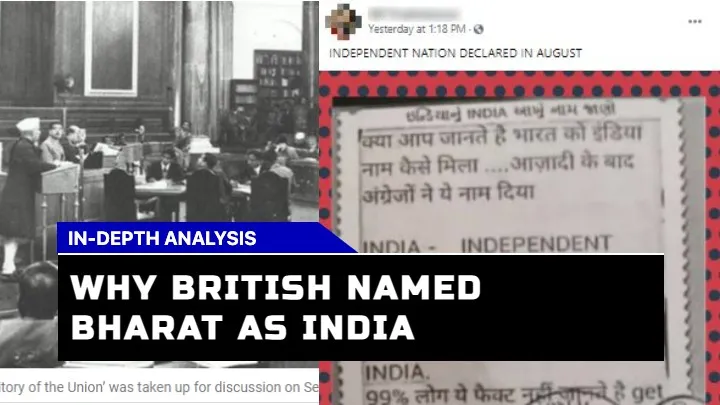|
Getting your Trinity Audio player ready...
|
Why Did the British Rename Bharat as India? the History “India” is derived from the river Sindhu, known as the Indus River. It has been in use since the time of the Greek historian Herodotus in the 5th century BCE. Meanwhile, “Bharat” is an ancient term, deeply entrenched in Indian culture and associated with the legendary king Bharat, mentioned in the epic Ramayana. So why did the British rename Bharat as India?

The decision by the British to rename Bharat can be attributed to several factors, including linguistic unfamiliarity, political considerations, and a desire for administrative ease. They initially arrived in a land with a rich tapestry of languages, cultures, and names and chose to adopt “India,” a term more familiar to them and the western world.
Summary of Why British Named Bharat as India
| Key Points | Description |
|---|---|
| Origin of the Name “India” | Derived from Sindhu (Indus River), used in Greek since the 5th century BCE. |
| Origin of the Name “Bharat” | Associated with the legendary king Bharat from the Ramayana. |
| British Unfamiliarity | British were possibly unaware of the term “Bharat.” |
| Administrative Ease | “India” was already familiar in Europe and easier for the British to use. |
| Political Considerations | The term “India” was seen as neutral and less threatening. |
| Current Rumors | Speculations exist about renaming India to Bharat. |
| Constitution of India | Article 1 uses the names “India” and “Bharat” interchangeably. |
The Complexity of Languages and Names
The British arrived in a land rich in linguistic diversity. Given that the term “India” was already prevalent in European literature, it made sense for them to continue using it. On the other hand, they might not have been familiar with the cultural significance of the term “Bharat.”
The Drive for Unity and Simplification
Another reason why the British named Bharat as India could be the need for a unified term that was already recognized in European circles. The name “India” provided this unity and administrative ease, facilitating their rule over the subcontinent.
Political Implications
The term “Bharat” holds cultural and historical importance. In contrast, “India” was perceived as more neutral, potentially making it easier for the British to establish and maintain control.
Constitutional Recognition
Article 1 of the Indian Constitution states: “India, that is Bharat, shall be a Union of States.” Despite the historical change by the British, the Constitution acknowledges both names.
Current Speculations and Rumors
In recent times, there has been speculation about changing the name of India back to Bharat. This has even fueled rumors around international platforms like the G20 summit, where world leaders were invited to dine with the “President of Bharat.”
The Cultural and Historical Tapestry
The roots of “Bharat” go deep into Indian history, embedded in Hindu epics like the Ramayana and Puranic literature. Despite British influence, the name still holds a significant place in Indian culture.
Why This Matters Now
Understanding why the British named Bharat as India can offer insights into the complex history and evolving identity of the country, especially at a time when there is ongoing debate about reverting the name back to its ancient origins.
FAQs
Why did the British prefer the name “India” over “Bharat”?
The British found the term “India” easier and more familiar, as it was already prevalent in European literature.
Is there any constitutional acknowledgment of the name “Bharat”?
Yes, Article 1 of the Indian Constitution recognizes both “India” and “Bharat.”
What is the origin of the name “Bharat”?
The name “Bharat” is associated with the legendary king Bharat, a character in the ancient Indian epic, the Ramayana.
Are there current efforts to rename India to Bharat?
There are speculations and rumors about renaming India to Bharat, but as of now, no official change has been made.
Understanding the history behind the name can offer a deeper perspective into India’s rich past and its evolving future.




















